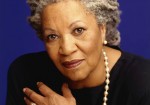In 1993, novelist Toni Morrison became the first black woman to receive the Nobel Prize in Literature, showing the world a critically-acclaimed artist could be a force of change.
On Monday, Chancellor Gene Block will award Morrison the UCLA Medal, which recognizes extraordinary achievement exemplifying UCLA’s values of integrity, excellence and accountability. The public ceremony in Royce Hall will include a panel discussion with UCLA graduate students and faculty about Morrison’s contributions to American literature and their connections to race-related issues.
“From my point of view, your life is already artful – waiting, just waiting, for you to make it art,” Morrison, a professor emeritus at Princeton University, told the graduating class of Wellesley College in 2004.
Morrison will participate in next week’s events by video conference because she has other work obligations at Princeton, said UCLA spokeswoman Jessica Wolf.
Chancellors, provosts and deans from any department can nominate individuals for the UCLA Medal, which has been awarded to over 140 individuals since its conception in 1979. Past recipients include former prime minister of Pakistan Benazir Bhutto and famous UCLA community members such as former men’s basketball coach John Wooden.
Christopher Waterman, former dean of UCLA School of the Arts and Architecture and world arts and cultures professor, nominated Morrison in March. Waterman’s nomination letter said her work draws on African American history and culture to address complex issues in race and gender discussions. Morrison’s Pulitzer Prize-winning novel “Beloved” tells the 19th-century tale of an African American woman who decides to kill her baby before they are sold into slavery.
Shamell Bell, a graduate student in culture and performance, will present with the Monday panel and discuss Morrison’s connection to the national Black Lives Matter movement, which aims to address systemic racism toward black people through activism. She said she thinks Morrison’s prominence as an artistic figure can shed more light on social justice issues.
“A lot of us activists are artists,” said Bell, who researches the use of inner-city street dance as a social movement. “A key (to our goals) is a direct connection between prominent artists and the current civil rights movement.”
Morrison also wrote a play called “Desdemona,” which will open at Freud Playhouse on Oct. 8. Peter Sellars, a world arts and cultures professor, will direct the production, which explores the perspectives of female characters from William Shakespeare’s tragic play “Othello.“
“(The play) is a radically feminist space,” Sellars said. “It’s rare to get this concentrated feminine intelligence, energy and beauty. I find the piece itself completely liberating.”
Sellars said he designed scenes in the play to represent a quiet, thoughtful space after death. The stage will be set with small bottles and cups, a nod to an African tradition of laying out dishware in graveyards to comfort loved ones’ spirits.
He added the play also appeals to the UCLA community because it presents a classic Shakespeare story with a 21st-century twist.
“The minute people start discussing race or gender, it gets complicated and people express themselves clumsily,” Sellars said. “When you have a writer of Toni’s stature who can express these things with such precision and elegance, (it creates) an emotional honesty.”
Yogita Goyal, an associate professor of English at UCLA, also said she believes Morrison’s original works capture the emotional intensity of experiences such as motherhood, orphanhood, love and pain.
Goyal, who wrote a book about African American literature in 2010, will participate in a panel discussion about “Desdemona” with Morrison, Sellars, faculty and “Desdemona” cast member and lead singer Rokia Traoré on Oct. 7.
“I was 15 years old when I read (my first Morrison book),” Goyal recalled. “It blew my mind in the way it was written – (her writing) transformed our thinking of what literature can do.”
